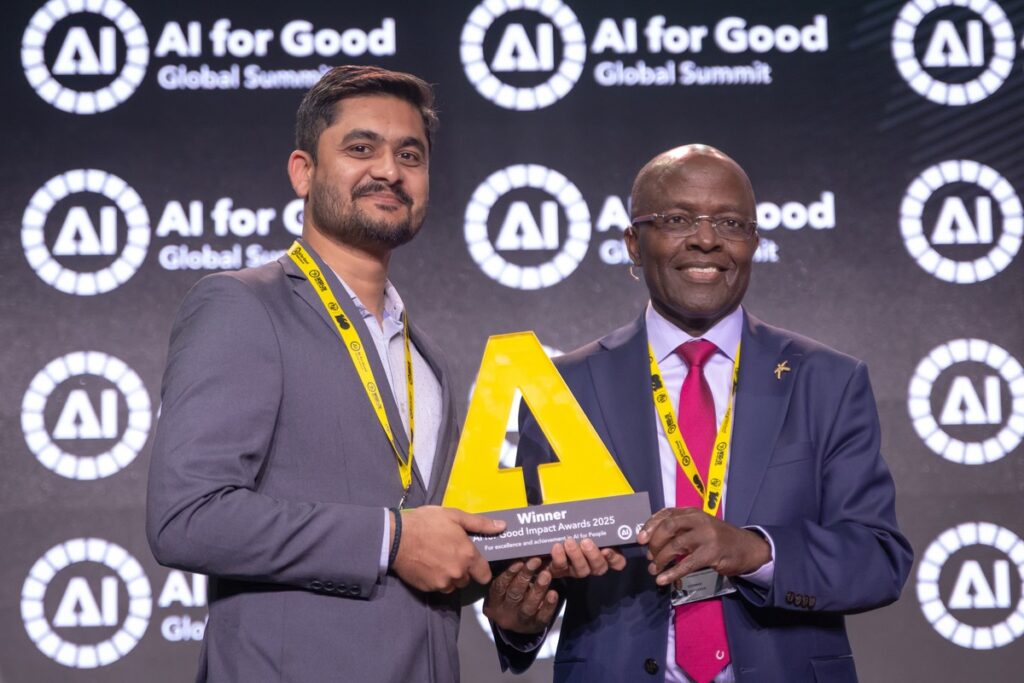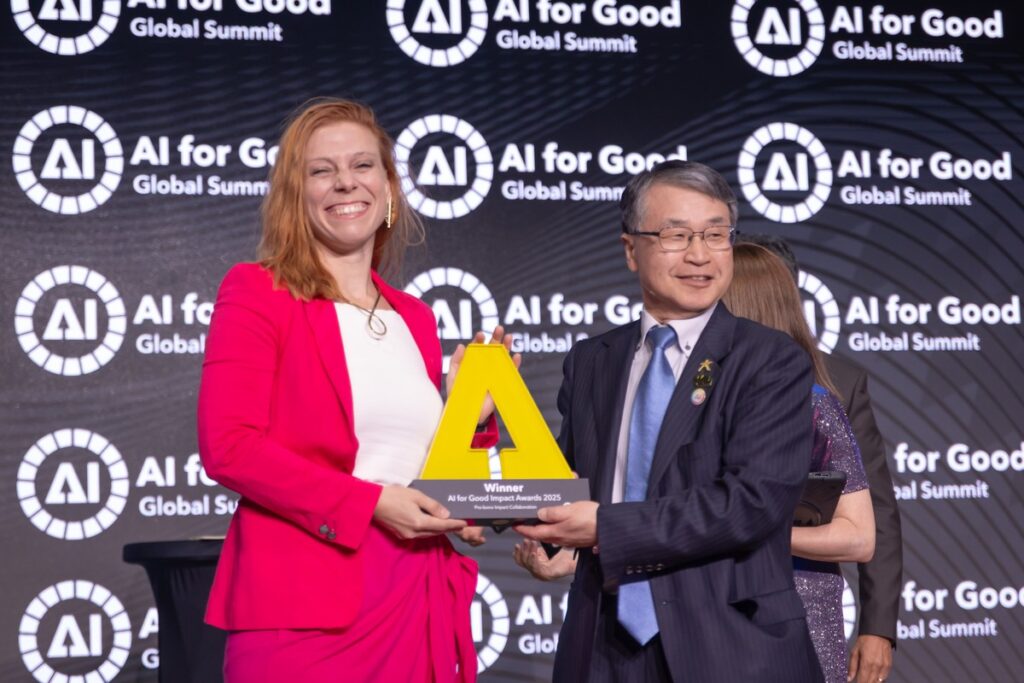
The AI for Good Impact Awards celebrate AI solutions that drive meaningful change by highlighting projects and partnerships that use AI to address current global challenges, emphasizing long term impact, ethical responsibility, and sustainability. Organized by the International Telecommunication Union, in partnership with Tech To The Rescue - a global nonprofit connecting social impact organizations with technology partners to enable AI for Good solutions, this year’s awards focused on three main categories: AI for People, AI for Planet, and AI for Prosperity, along with a special Pro Bono Collaboration Award, co-developed with Tech To The Rescue, celebrated purpose-driven partnerships between tech companies and changemakers working together for the public good. These categories reflect the diverse ways AI is being used to improve lives, protect the environment, and fostering inclusive development.
The 2025 AI for Good Impact Awards took place on 9 July during the AI for Good Global Summit in Geneva. Finalists from around the world were invited to attend the ceremony, where the winners were officially announced and recognized for their outstanding contributions.
The AI for Good Impact Awards celebrate AI solutions that drive meaningful change by highlighting projects and partnerships that use AI to address current global challenges, emphasizing long term impact, ethical responsibility, and sustainability. Organized by the International Telecommunication Union, in partnership with Tech To The Rescue – a global nonprofit connecting social impact organizations with technology partners to enable AI for Good solutions, this year’s awards focused on three main categories: AI for People, AI for Planet, and AI for Prosperity, along with a special Pro Bono Collaboration Award, co-developed with Tech To The Rescue, celebrated purpose-driven partnerships between tech companies and changemakers working together for the public good. These categories reflect the diverse ways AI is being used to improve lives, protect the environment, and fostering inclusive development. The awards were open to all types of applicants, from individual innovators and SMEs to universities, non-profits, and government institutions. At the heart of the awards is not size or reputation, but the real-world impact of the solutions and their contribution to a more sustainable, equitable future. In total, more than 320 applications were submitted and, following a careful evaluation process, 12 outstanding finalists were selected and invited to the Global Summit in Geneva.
These finalists represented a diverse range of AI-driven projects, reflecting the diversity and ambition of this year’s award categories. The AI for People category focused on projects that improve health, education, equality, and well-being. The AI for Planet category honored solutions tackling environmental challenges, such as climate action and resource protection. The AI for Prosperity category recognized efforts that support economic growth, innovation, peace and inclusive development. The Pro Bono Collaboration Award, curated by Tech To The Rescue based on their expertise in facilitating over 1,000 tech-for-good partnerships across 80+ countries, celebrated purpose-driven partnerships between tech companies and changemakers working together for the public good. Projects were judged based on innovation, measurable impact, long-term sustainability, alignment with global challenges, and adherence to ethical AI principles. The AI for Good Impact Awards shed light on the ideas and partnerships that are moving the world forward with care, responsibility, and purpose.

AI for People Winner
In the AI for People category, the three finalists stood out for their innovative work. HERA Digital Health developed a WhatsApp chatbot co-created with refugee communities to strengthen healthcare access and autonomy for refugee women. The chatbot offers personalized, culturally sensitive support and helps manage health records, making care more accessible in challenging contexts. Meanwhile, I-Stem’s platform, Nclude, uses AI to improve digital accessibility and career guidance for people with disabilities. Through a voice-first, inclusive experience available on WhatsApp, IVR, and the web, Nclude empowers users to discover opportunities and access services with greater independence.
Taking home the AI for People Award was CareNX Innovations, a health-tech company focused on reducing maternal and infant mortality using AI. Their solution, Fetosense, is an AI-powered fetal monitoring system that detects fetal distress early even in low-resource and rural areas where specialist doctors may not be available. Founded by Aditya Kulkarni, CareNX Innovations equips general physicians, midwives, and frontline health workers with a portable, easy-to-use device connected to a mobile app. Fetosense uses machine learning and deep learning to interpret cardiotocography (CTG) data, tracking fetal heart rate and uterine contractions, and provides real-time clinical insights based on global obstetric guidelines. This helps healthcare workers make timely, evidence-based decisions that improve outcomes for mothers and babies.
With over 500,000 pregnancies monitored across six countries and a 30% reduction in NICU admissions, Fetosense has been successfully deployed in more than 2,500 clinics. CareNX has partnered with organizations such as UNICEF and MIT Solve to scale their innovation, including open sourcing their AI model to support equitable access to quality maternal care worldwide. By combining affordability, portability, and AI-driven decision support, Fetosense is bridging the gap between primary care and specialist obstetrics, helping reduce preventable stillbirths and neonatal complications, giving them this year’s first place.
AI for Planet Winner
Finalists in the AI for Planet category tackled climate challenges head-on. Farm Assist and Quartz Solar AI Cloudcasting brought impressive solutions to the table which address environmental sustainability through AI. Farm Assist, developed by Soil Solutions Ghana, uses satellite imagery and machine learning to analyze soil health and land degradation. The platform provides tailored recommendations to support regenerative farming and climate-resilient agriculture, helping farmers protect and restore their land. Quartz Solar AI Cloudcasting, from Open Climate Fix, focuses on improving the accuracy of solar power forecasts. Their open-source AI model predicts cloud movements to better anticipate solar energy generation, supporting cleaner and more reliable renewable energy systems.
However, taking home the AI for Planet Award was Smart-Catch, developed by WorldFish and represented by data scientist Hamza Altarturi (video message) and Lorenzo Longobardi, data scientist at WorldFish, for its groundbreaking work in advancing climate-smart fisheries management. WorldFish is an international research organization dedicated to building resilient aquatic food systems to reduce hunger, poverty, and malnutrition with a global presence spanning Africa, Asia, and the Pacific. Smart-Catch is part of an integrated AI-powered platform designed to promote climate-smart fisheries management on a national scale. The platform, known as the AI-SSF Sustainability Suite, combines machine learning, computer vision, natural language processing, and large language models to support small-scale fishers operating in resource-constrained regions.
At the core of the system is the Peskas decision support environment, which aggregates fisheries data across Asia and Africa into a cloud-based analytics platform. Smart-Catch uses on-device species recognition to streamline catch reporting, dramatically reducing manual entry time and improving data accuracy. Complementing this are Ask-Data, a large language model interface that provides real-time, plain-language insights from live fisheries data, and Eco-Route, an AI route optimization tool that helps fishers reduce fuel consumption and emissions by modeling optimal vessel paths. By integrating environmental, spatial, biological, and socio-economic data, the platform supports sustainable management of nearly 1.43 million square kilometers of marine fisheries and enhances the livelihoods of approximately 120,000 small-scale fishers. It addresses critical planetary challenges such as biodiversity loss, carbon emissions, and climate-induced shifts in fish populations by promoting adaptive, data-driven fishing practices, marking a major step forward in empowering fishing communities to navigate the complex challenges posed by climate change and to build more sustainable futures.
AI for Prosperity Winner
The AI for Prosperity category featured tools aimed at building safer and stronger communities. In this category, UNOPS presented AI Lifecycle Support for Mine Action, a tool that uses geospatial analysis and satellite imagery to prioritize mine clearance and assess the impact of cleared land for future development.The Humanitarian OpenStreetMap Team also introduced fAIr, a community-led AI-assisted mapping suite. Combining open satellite imagery with local input, fAIr rapidly creates detailed maps that improve emergency response and save lives in vulnerable regions.
This year’s AI for Prosperity Award went to Farmer.Chat, developed by Digital Green and represented by CEO Rikin Gandhi. Farmer.Chat is an AI-powered platform designed specifically to support smallholder farmers, many of whom face poverty, climate risks, and limited access to information, especially women farmers. The platform provides timely, localized agricultural advice in formats that fit low-literacy and low-connectivity settings, such as voice, text, images, and video. Using advanced AI technologies like large language models and speech recognition, Farmer.Chat answers farmers’ questions, sends proactive advisories, and learns from user feedback to continuously improve.
Currently active in countries including India, Ethiopia, Kenya, and Nigeria, Farmer.Chat has already reached over 460,000 farmers. Unlike traditional one-way extension services, it adapts advice to each farmer’s local context and needs. Through trusted partnerships with governments and local groups, Digital Green plans to expand Farmer.Chat to reach 5 million more farmers in the next three years, focusing on empowering women and building a more inclusive agricultural future.
Pro Bono Collaboration Winner
In this category, three projects stood out for their commitment to using AI for public good through partnership: Defensa+AI, developed by SidLabs Online LLP in partnership with the Sociedad Peruana de Derecho Ambiental (SPDA), is an AI-powered tool designed to combat environmental crime in the Peruvian Amazon. It delivers low-cost, real-time alerts to NGOs, local communities, and government authorities, helping detect and prevent illegal activities like logging or mining in one of the world’s most vulnerable ecosystems.
SidLabs Online LLP was also recognized for LexAid, developed in collaboration with AsyLex. This AI tool supports asylum seekers in Switzerland by generating legally grounded appeal drafts tailored to individual cases. The drafts are reviewed by attorneys, allowing for faster, more accessible legal support for people navigating complex asylum processes. The winning project in this category was Chatbot Sophia from Spring ACT – Action. Compassion. Technology., represented by Executive Director Rhiana Spring. Sophia is the world’s first global AI-driven chatbot designed to support people affected by domestic violence. Available 24/7, free of charge, and in more than 20 languages, Sophia helps users gather potential evidence, understand their legal rights, and explore safe options, all without leaving a digital trace.
Built using cutting-edge AI technologies including generative AI, NLP, and anomaly detection, Sophia offers anonymous support through its browser version (sophia.chat) as well as on platforms like WhatsApp, Telegram, and Viber. The platform includes a unique digital safe where users can securely store information without fear of detection. So far, Sophia has reached over 41,000 users across 172 countries. This global reach, combined with a strong focus on safety, anonymity, and accessibility, highlights the potential of AI partnerships to offer practical and life changing support where it’s needed most.

We hope these stories inspire more people to explore how AI can be used to address real world problems. Whether you’re a student, a startup, or a global organization, there’s space for everyone to create meaningful impact. We look forward to seeing even more daring and impactful projects at next year’s AI for Good Impact Awards.


